A Comprehensive Analysis of Energy Policy and Climate Change Law
VerifiedAdded on 2022/08/13
|13
|4017
|14
Report
AI Summary
This report provides a comprehensive analysis of energy policy and climate change law, focusing on the context of Ireland and its relationship with international agreements such as the UNFCCC, Kyoto Protocol, and the Paris Agreement. It examines the role of the Irish government in meeting its commitments under these agreements, including the National Policy Position on Climate Action and Low Carbon Development. The report also delves into the Renewable Energy Directive 2009/28/EC and its revisions, particularly Directive (EU) 2018/2001, emphasizing the EU's targets for renewable energy consumption. Furthermore, it discusses the significance of onshore wind energy in Ireland and the support mechanisms in place. The report highlights the evolution of energy policy within the framework of climate change, emphasizing the importance of renewable energy sources and the transition towards a low-carbon economy.
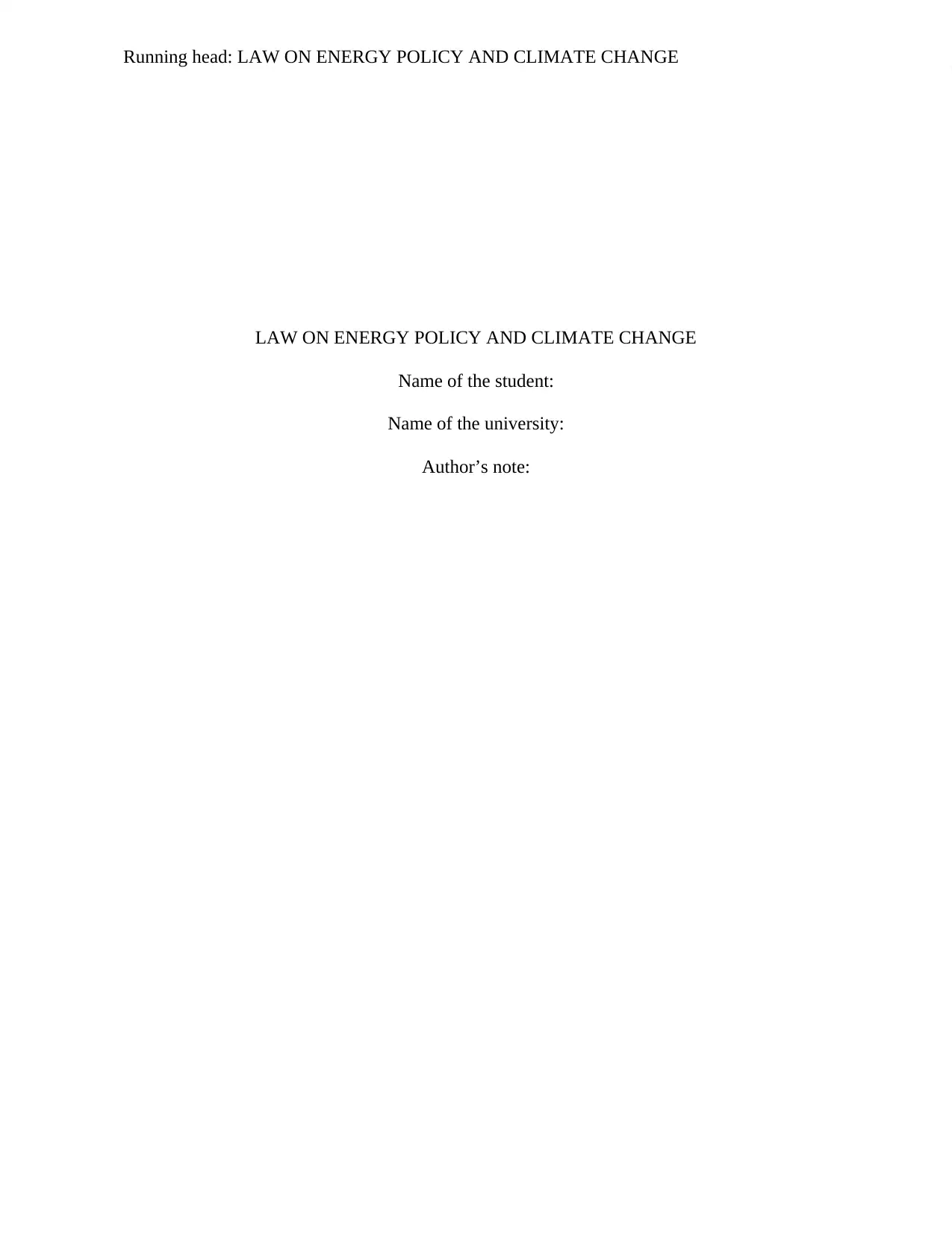
Running head: LAW ON ENERGY POLICY AND CLIMATE CHANGE
0
LAW ON ENERGY POLICY AND CLIMATE CHANGE
Name of the student:
Name of the university:
Author’s note:
0
LAW ON ENERGY POLICY AND CLIMATE CHANGE
Name of the student:
Name of the university:
Author’s note:
Paraphrase This Document
Need a fresh take? Get an instant paraphrase of this document with our AI Paraphraser
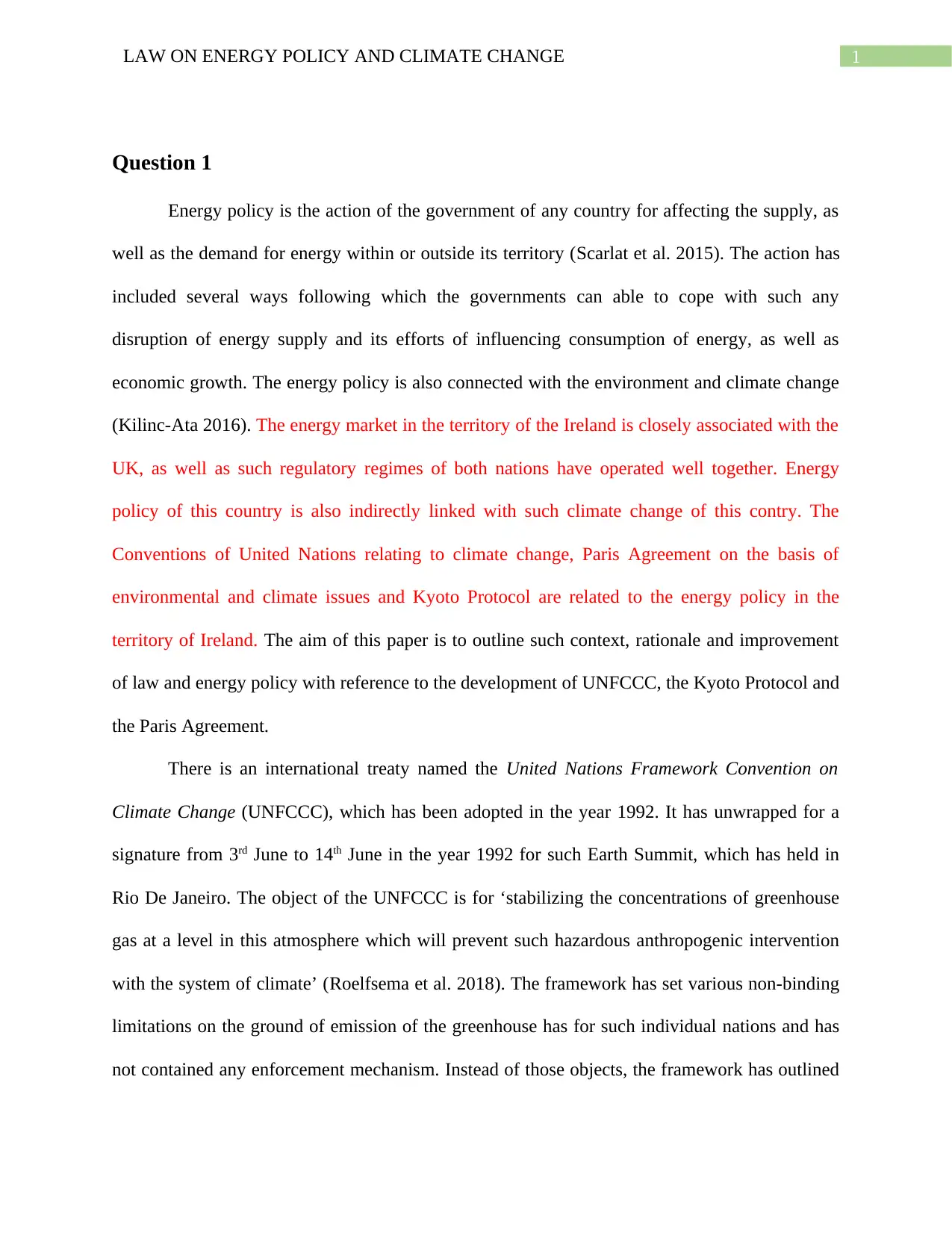
1LAW ON ENERGY POLICY AND CLIMATE CHANGE
Question 1
Energy policy is the action of the government of any country for affecting the supply, as
well as the demand for energy within or outside its territory (Scarlat et al. 2015). The action has
included several ways following which the governments can able to cope with such any
disruption of energy supply and its efforts of influencing consumption of energy, as well as
economic growth. The energy policy is also connected with the environment and climate change
(Kilinc-Ata 2016). The energy market in the territory of the Ireland is closely associated with the
UK, as well as such regulatory regimes of both nations have operated well together. Energy
policy of this country is also indirectly linked with such climate change of this contry. The
Conventions of United Nations relating to climate change, Paris Agreement on the basis of
environmental and climate issues and Kyoto Protocol are related to the energy policy in the
territory of Ireland. The aim of this paper is to outline such context, rationale and improvement
of law and energy policy with reference to the development of UNFCCC, the Kyoto Protocol and
the Paris Agreement.
There is an international treaty named the United Nations Framework Convention on
Climate Change (UNFCCC), which has been adopted in the year 1992. It has unwrapped for a
signature from 3rd June to 14th June in the year 1992 for such Earth Summit, which has held in
Rio De Janeiro. The object of the UNFCCC is for ‘stabilizing the concentrations of greenhouse
gas at a level in this atmosphere which will prevent such hazardous anthropogenic intervention
with the system of climate’ (Roelfsema et al. 2018). The framework has set various non-binding
limitations on the ground of emission of the greenhouse has for such individual nations and has
not contained any enforcement mechanism. Instead of those objects, the framework has outlined
Question 1
Energy policy is the action of the government of any country for affecting the supply, as
well as the demand for energy within or outside its territory (Scarlat et al. 2015). The action has
included several ways following which the governments can able to cope with such any
disruption of energy supply and its efforts of influencing consumption of energy, as well as
economic growth. The energy policy is also connected with the environment and climate change
(Kilinc-Ata 2016). The energy market in the territory of the Ireland is closely associated with the
UK, as well as such regulatory regimes of both nations have operated well together. Energy
policy of this country is also indirectly linked with such climate change of this contry. The
Conventions of United Nations relating to climate change, Paris Agreement on the basis of
environmental and climate issues and Kyoto Protocol are related to the energy policy in the
territory of Ireland. The aim of this paper is to outline such context, rationale and improvement
of law and energy policy with reference to the development of UNFCCC, the Kyoto Protocol and
the Paris Agreement.
There is an international treaty named the United Nations Framework Convention on
Climate Change (UNFCCC), which has been adopted in the year 1992. It has unwrapped for a
signature from 3rd June to 14th June in the year 1992 for such Earth Summit, which has held in
Rio De Janeiro. The object of the UNFCCC is for ‘stabilizing the concentrations of greenhouse
gas at a level in this atmosphere which will prevent such hazardous anthropogenic intervention
with the system of climate’ (Roelfsema et al. 2018). The framework has set various non-binding
limitations on the ground of emission of the greenhouse has for such individual nations and has
not contained any enforcement mechanism. Instead of those objects, the framework has outlined
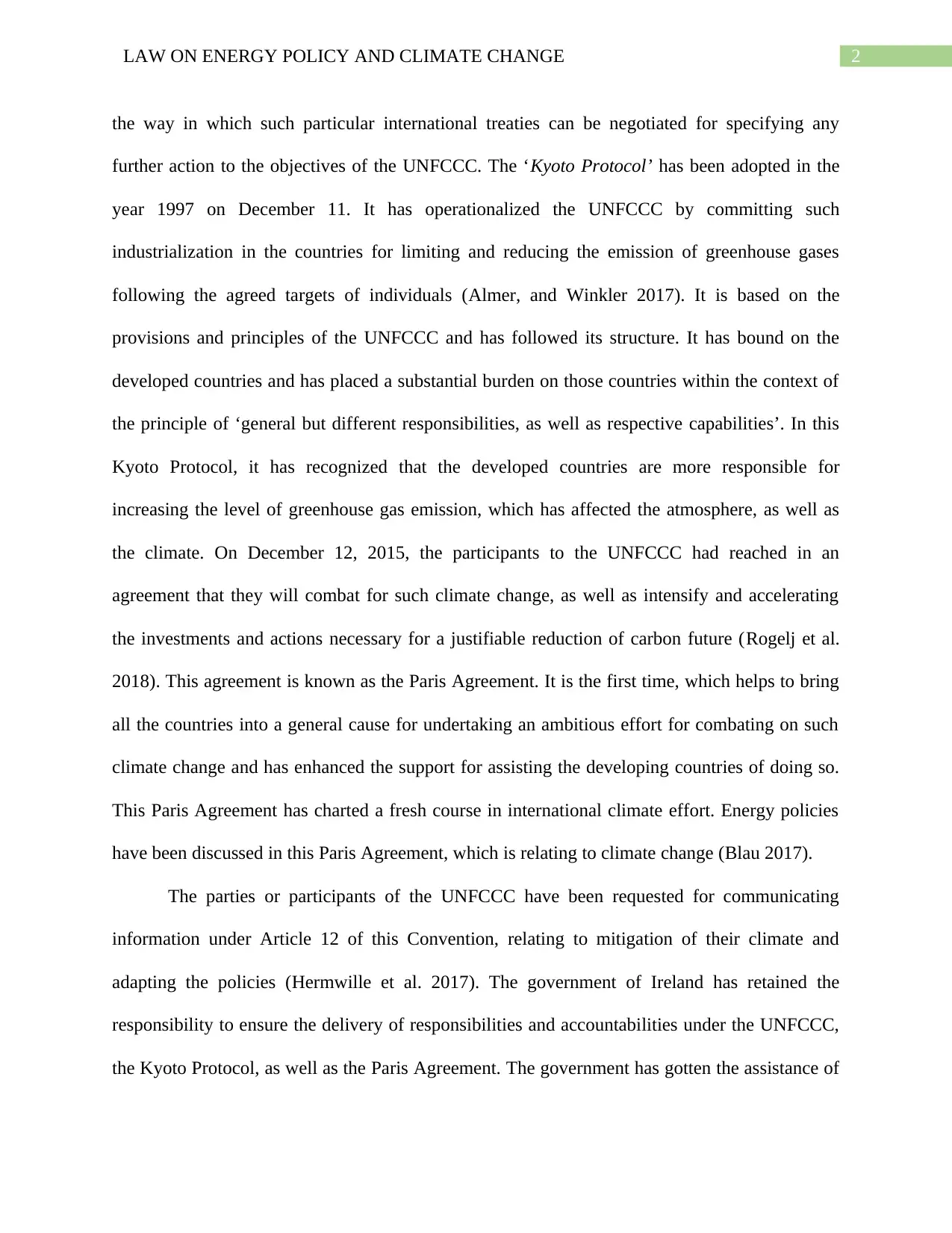
2LAW ON ENERGY POLICY AND CLIMATE CHANGE
the way in which such particular international treaties can be negotiated for specifying any
further action to the objectives of the UNFCCC. The ‘Kyoto Protocol’ has been adopted in the
year 1997 on December 11. It has operationalized the UNFCCC by committing such
industrialization in the countries for limiting and reducing the emission of greenhouse gases
following the agreed targets of individuals (Almer, and Winkler 2017). It is based on the
provisions and principles of the UNFCCC and has followed its structure. It has bound on the
developed countries and has placed a substantial burden on those countries within the context of
the principle of ‘general but different responsibilities, as well as respective capabilities’. In this
Kyoto Protocol, it has recognized that the developed countries are more responsible for
increasing the level of greenhouse gas emission, which has affected the atmosphere, as well as
the climate. On December 12, 2015, the participants to the UNFCCC had reached in an
agreement that they will combat for such climate change, as well as intensify and accelerating
the investments and actions necessary for a justifiable reduction of carbon future (Rogelj et al.
2018). This agreement is known as the Paris Agreement. It is the first time, which helps to bring
all the countries into a general cause for undertaking an ambitious effort for combating on such
climate change and has enhanced the support for assisting the developing countries of doing so.
This Paris Agreement has charted a fresh course in international climate effort. Energy policies
have been discussed in this Paris Agreement, which is relating to climate change (Blau 2017).
The parties or participants of the UNFCCC have been requested for communicating
information under Article 12 of this Convention, relating to mitigation of their climate and
adapting the policies (Hermwille et al. 2017). The government of Ireland has retained the
responsibility to ensure the delivery of responsibilities and accountabilities under the UNFCCC,
the Kyoto Protocol, as well as the Paris Agreement. The government has gotten the assistance of
the way in which such particular international treaties can be negotiated for specifying any
further action to the objectives of the UNFCCC. The ‘Kyoto Protocol’ has been adopted in the
year 1997 on December 11. It has operationalized the UNFCCC by committing such
industrialization in the countries for limiting and reducing the emission of greenhouse gases
following the agreed targets of individuals (Almer, and Winkler 2017). It is based on the
provisions and principles of the UNFCCC and has followed its structure. It has bound on the
developed countries and has placed a substantial burden on those countries within the context of
the principle of ‘general but different responsibilities, as well as respective capabilities’. In this
Kyoto Protocol, it has recognized that the developed countries are more responsible for
increasing the level of greenhouse gas emission, which has affected the atmosphere, as well as
the climate. On December 12, 2015, the participants to the UNFCCC had reached in an
agreement that they will combat for such climate change, as well as intensify and accelerating
the investments and actions necessary for a justifiable reduction of carbon future (Rogelj et al.
2018). This agreement is known as the Paris Agreement. It is the first time, which helps to bring
all the countries into a general cause for undertaking an ambitious effort for combating on such
climate change and has enhanced the support for assisting the developing countries of doing so.
This Paris Agreement has charted a fresh course in international climate effort. Energy policies
have been discussed in this Paris Agreement, which is relating to climate change (Blau 2017).
The parties or participants of the UNFCCC have been requested for communicating
information under Article 12 of this Convention, relating to mitigation of their climate and
adapting the policies (Hermwille et al. 2017). The government of Ireland has retained the
responsibility to ensure the delivery of responsibilities and accountabilities under the UNFCCC,
the Kyoto Protocol, as well as the Paris Agreement. The government has gotten the assistance of
⊘ This is a preview!⊘
Do you want full access?
Subscribe today to unlock all pages.

Trusted by 1+ million students worldwide
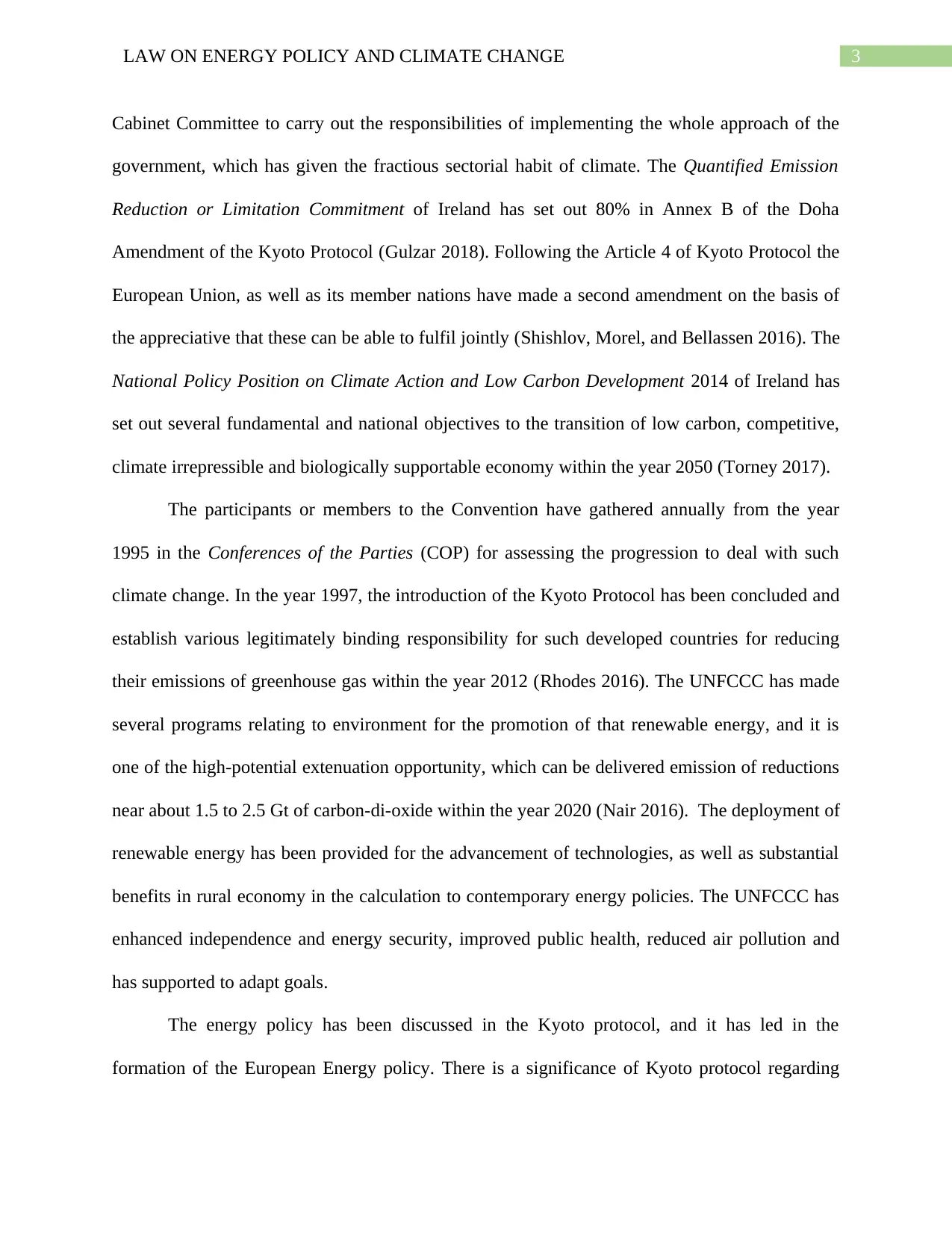
3LAW ON ENERGY POLICY AND CLIMATE CHANGE
Cabinet Committee to carry out the responsibilities of implementing the whole approach of the
government, which has given the fractious sectorial habit of climate. The Quantified Emission
Reduction or Limitation Commitment of Ireland has set out 80% in Annex B of the Doha
Amendment of the Kyoto Protocol (Gulzar 2018). Following the Article 4 of Kyoto Protocol the
European Union, as well as its member nations have made a second amendment on the basis of
the appreciative that these can be able to fulfil jointly (Shishlov, Morel, and Bellassen 2016). The
National Policy Position on Climate Action and Low Carbon Development 2014 of Ireland has
set out several fundamental and national objectives to the transition of low carbon, competitive,
climate irrepressible and biologically supportable economy within the year 2050 (Torney 2017).
The participants or members to the Convention have gathered annually from the year
1995 in the Conferences of the Parties (COP) for assessing the progression to deal with such
climate change. In the year 1997, the introduction of the Kyoto Protocol has been concluded and
establish various legitimately binding responsibility for such developed countries for reducing
their emissions of greenhouse gas within the year 2012 (Rhodes 2016). The UNFCCC has made
several programs relating to environment for the promotion of that renewable energy, and it is
one of the high-potential extenuation opportunity, which can be delivered emission of reductions
near about 1.5 to 2.5 Gt of carbon-di-oxide within the year 2020 (Nair 2016). The deployment of
renewable energy has been provided for the advancement of technologies, as well as substantial
benefits in rural economy in the calculation to contemporary energy policies. The UNFCCC has
enhanced independence and energy security, improved public health, reduced air pollution and
has supported to adapt goals.
The energy policy has been discussed in the Kyoto protocol, and it has led in the
formation of the European Energy policy. There is a significance of Kyoto protocol regarding
Cabinet Committee to carry out the responsibilities of implementing the whole approach of the
government, which has given the fractious sectorial habit of climate. The Quantified Emission
Reduction or Limitation Commitment of Ireland has set out 80% in Annex B of the Doha
Amendment of the Kyoto Protocol (Gulzar 2018). Following the Article 4 of Kyoto Protocol the
European Union, as well as its member nations have made a second amendment on the basis of
the appreciative that these can be able to fulfil jointly (Shishlov, Morel, and Bellassen 2016). The
National Policy Position on Climate Action and Low Carbon Development 2014 of Ireland has
set out several fundamental and national objectives to the transition of low carbon, competitive,
climate irrepressible and biologically supportable economy within the year 2050 (Torney 2017).
The participants or members to the Convention have gathered annually from the year
1995 in the Conferences of the Parties (COP) for assessing the progression to deal with such
climate change. In the year 1997, the introduction of the Kyoto Protocol has been concluded and
establish various legitimately binding responsibility for such developed countries for reducing
their emissions of greenhouse gas within the year 2012 (Rhodes 2016). The UNFCCC has made
several programs relating to environment for the promotion of that renewable energy, and it is
one of the high-potential extenuation opportunity, which can be delivered emission of reductions
near about 1.5 to 2.5 Gt of carbon-di-oxide within the year 2020 (Nair 2016). The deployment of
renewable energy has been provided for the advancement of technologies, as well as substantial
benefits in rural economy in the calculation to contemporary energy policies. The UNFCCC has
enhanced independence and energy security, improved public health, reduced air pollution and
has supported to adapt goals.
The energy policy has been discussed in the Kyoto protocol, and it has led in the
formation of the European Energy policy. There is a significance of Kyoto protocol regarding
Paraphrase This Document
Need a fresh take? Get an instant paraphrase of this document with our AI Paraphraser
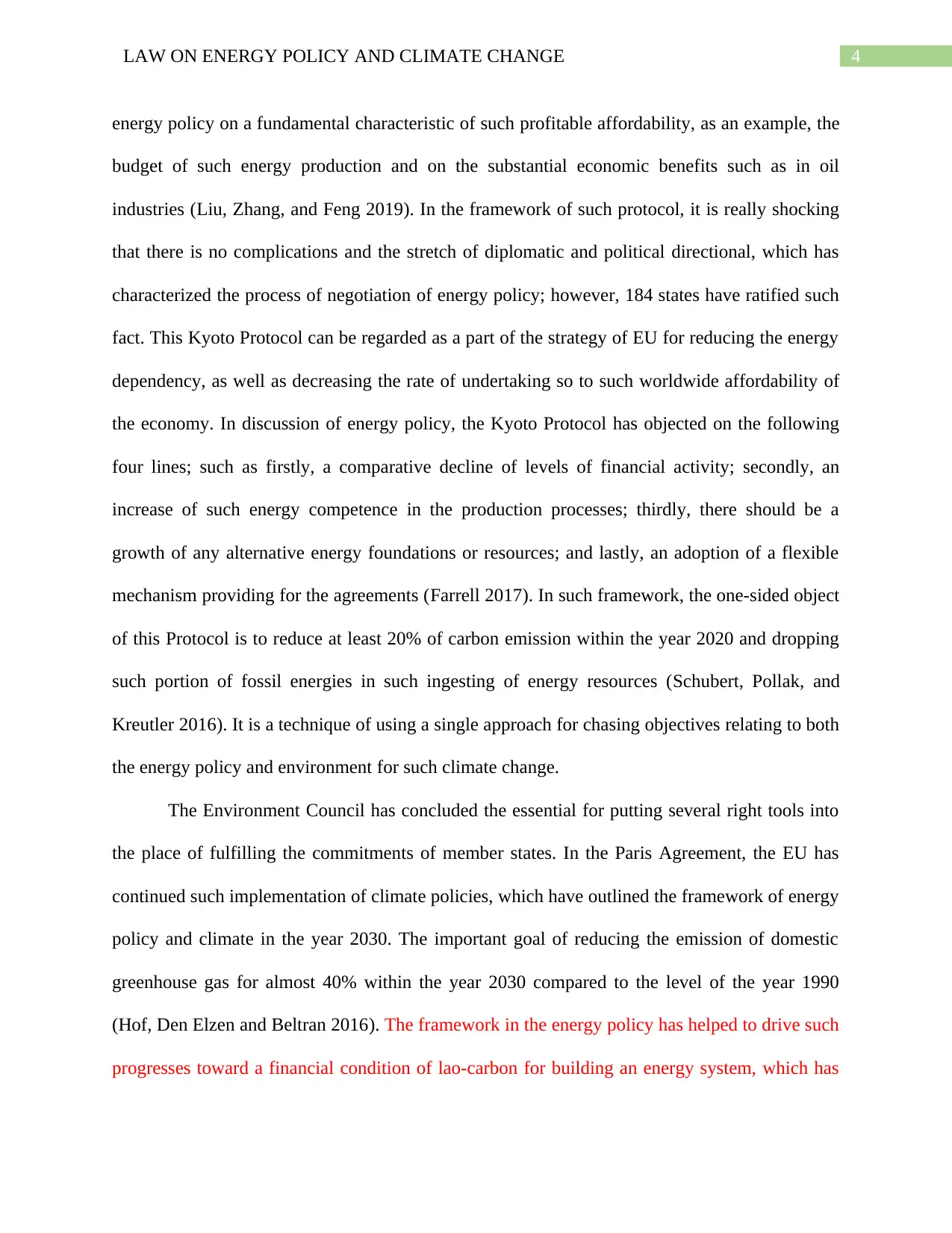
4LAW ON ENERGY POLICY AND CLIMATE CHANGE
energy policy on a fundamental characteristic of such profitable affordability, as an example, the
budget of such energy production and on the substantial economic benefits such as in oil
industries (Liu, Zhang, and Feng 2019). In the framework of such protocol, it is really shocking
that there is no complications and the stretch of diplomatic and political directional, which has
characterized the process of negotiation of energy policy; however, 184 states have ratified such
fact. This Kyoto Protocol can be regarded as a part of the strategy of EU for reducing the energy
dependency, as well as decreasing the rate of undertaking so to such worldwide affordability of
the economy. In discussion of energy policy, the Kyoto Protocol has objected on the following
four lines; such as firstly, a comparative decline of levels of financial activity; secondly, an
increase of such energy competence in the production processes; thirdly, there should be a
growth of any alternative energy foundations or resources; and lastly, an adoption of a flexible
mechanism providing for the agreements (Farrell 2017). In such framework, the one-sided object
of this Protocol is to reduce at least 20% of carbon emission within the year 2020 and dropping
such portion of fossil energies in such ingesting of energy resources (Schubert, Pollak, and
Kreutler 2016). It is a technique of using a single approach for chasing objectives relating to both
the energy policy and environment for such climate change.
The Environment Council has concluded the essential for putting several right tools into
the place of fulfilling the commitments of member states. In the Paris Agreement, the EU has
continued such implementation of climate policies, which have outlined the framework of energy
policy and climate in the year 2030. The important goal of reducing the emission of domestic
greenhouse gas for almost 40% within the year 2030 compared to the level of the year 1990
(Hof, Den Elzen and Beltran 2016). The framework in the energy policy has helped to drive such
progresses toward a financial condition of lao-carbon for building an energy system, which has
energy policy on a fundamental characteristic of such profitable affordability, as an example, the
budget of such energy production and on the substantial economic benefits such as in oil
industries (Liu, Zhang, and Feng 2019). In the framework of such protocol, it is really shocking
that there is no complications and the stretch of diplomatic and political directional, which has
characterized the process of negotiation of energy policy; however, 184 states have ratified such
fact. This Kyoto Protocol can be regarded as a part of the strategy of EU for reducing the energy
dependency, as well as decreasing the rate of undertaking so to such worldwide affordability of
the economy. In discussion of energy policy, the Kyoto Protocol has objected on the following
four lines; such as firstly, a comparative decline of levels of financial activity; secondly, an
increase of such energy competence in the production processes; thirdly, there should be a
growth of any alternative energy foundations or resources; and lastly, an adoption of a flexible
mechanism providing for the agreements (Farrell 2017). In such framework, the one-sided object
of this Protocol is to reduce at least 20% of carbon emission within the year 2020 and dropping
such portion of fossil energies in such ingesting of energy resources (Schubert, Pollak, and
Kreutler 2016). It is a technique of using a single approach for chasing objectives relating to both
the energy policy and environment for such climate change.
The Environment Council has concluded the essential for putting several right tools into
the place of fulfilling the commitments of member states. In the Paris Agreement, the EU has
continued such implementation of climate policies, which have outlined the framework of energy
policy and climate in the year 2030. The important goal of reducing the emission of domestic
greenhouse gas for almost 40% within the year 2030 compared to the level of the year 1990
(Hof, Den Elzen and Beltran 2016). The framework in the energy policy has helped to drive such
progresses toward a financial condition of lao-carbon for building an energy system, which has
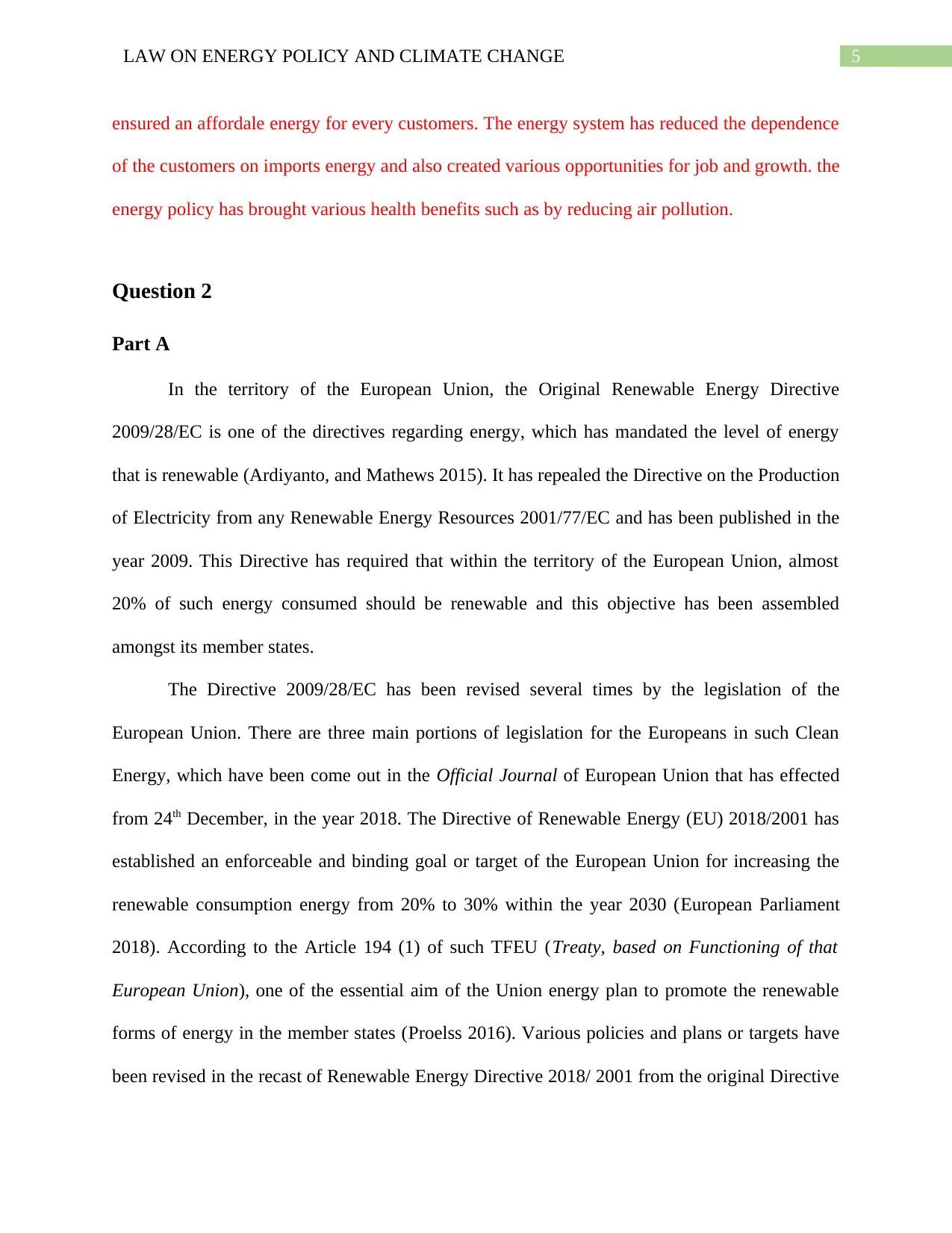
5LAW ON ENERGY POLICY AND CLIMATE CHANGE
ensured an affordale energy for every customers. The energy system has reduced the dependence
of the customers on imports energy and also created various opportunities for job and growth. the
energy policy has brought various health benefits such as by reducing air pollution.
Question 2
Part A
In the territory of the European Union, the Original Renewable Energy Directive
2009/28/EC is one of the directives regarding energy, which has mandated the level of energy
that is renewable (Ardiyanto, and Mathews 2015). It has repealed the Directive on the Production
of Electricity from any Renewable Energy Resources 2001/77/EC and has been published in the
year 2009. This Directive has required that within the territory of the European Union, almost
20% of such energy consumed should be renewable and this objective has been assembled
amongst its member states.
The Directive 2009/28/EC has been revised several times by the legislation of the
European Union. There are three main portions of legislation for the Europeans in such Clean
Energy, which have been come out in the Official Journal of European Union that has effected
from 24th December, in the year 2018. The Directive of Renewable Energy (EU) 2018/2001 has
established an enforceable and binding goal or target of the European Union for increasing the
renewable consumption energy from 20% to 30% within the year 2030 (European Parliament
2018). According to the Article 194 (1) of such TFEU (Treaty, based on Functioning of that
European Union), one of the essential aim of the Union energy plan to promote the renewable
forms of energy in the member states (Proelss 2016). Various policies and plans or targets have
been revised in the recast of Renewable Energy Directive 2018/ 2001 from the original Directive
ensured an affordale energy for every customers. The energy system has reduced the dependence
of the customers on imports energy and also created various opportunities for job and growth. the
energy policy has brought various health benefits such as by reducing air pollution.
Question 2
Part A
In the territory of the European Union, the Original Renewable Energy Directive
2009/28/EC is one of the directives regarding energy, which has mandated the level of energy
that is renewable (Ardiyanto, and Mathews 2015). It has repealed the Directive on the Production
of Electricity from any Renewable Energy Resources 2001/77/EC and has been published in the
year 2009. This Directive has required that within the territory of the European Union, almost
20% of such energy consumed should be renewable and this objective has been assembled
amongst its member states.
The Directive 2009/28/EC has been revised several times by the legislation of the
European Union. There are three main portions of legislation for the Europeans in such Clean
Energy, which have been come out in the Official Journal of European Union that has effected
from 24th December, in the year 2018. The Directive of Renewable Energy (EU) 2018/2001 has
established an enforceable and binding goal or target of the European Union for increasing the
renewable consumption energy from 20% to 30% within the year 2030 (European Parliament
2018). According to the Article 194 (1) of such TFEU (Treaty, based on Functioning of that
European Union), one of the essential aim of the Union energy plan to promote the renewable
forms of energy in the member states (Proelss 2016). Various policies and plans or targets have
been revised in the recast of Renewable Energy Directive 2018/ 2001 from the original Directive
⊘ This is a preview!⊘
Do you want full access?
Subscribe today to unlock all pages.

Trusted by 1+ million students worldwide
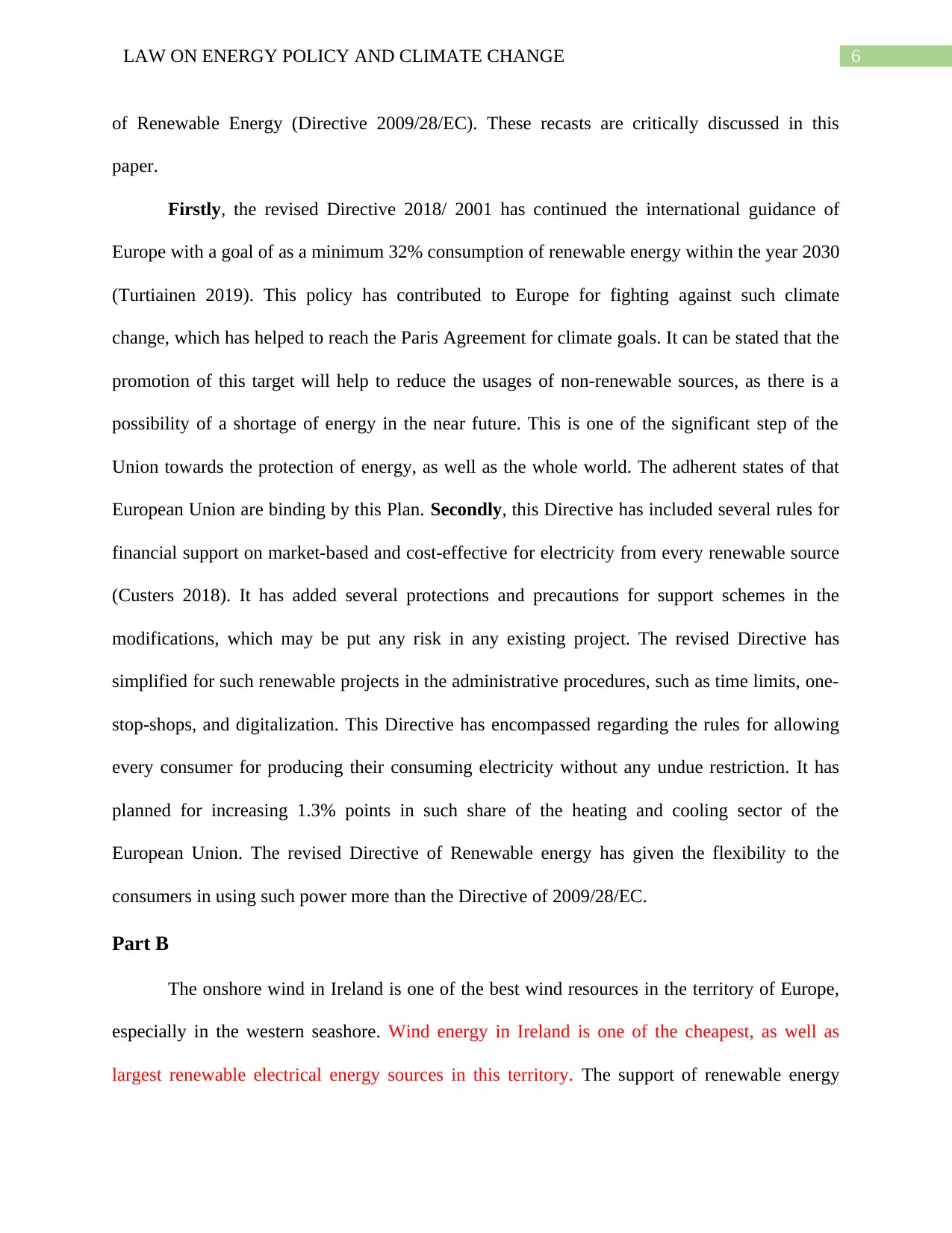
6LAW ON ENERGY POLICY AND CLIMATE CHANGE
of Renewable Energy (Directive 2009/28/EC). These recasts are critically discussed in this
paper.
Firstly, the revised Directive 2018/ 2001 has continued the international guidance of
Europe with a goal of as a minimum 32% consumption of renewable energy within the year 2030
(Turtiainen 2019). This policy has contributed to Europe for fighting against such climate
change, which has helped to reach the Paris Agreement for climate goals. It can be stated that the
promotion of this target will help to reduce the usages of non-renewable sources, as there is a
possibility of a shortage of energy in the near future. This is one of the significant step of the
Union towards the protection of energy, as well as the whole world. The adherent states of that
European Union are binding by this Plan. Secondly, this Directive has included several rules for
financial support on market-based and cost-effective for electricity from every renewable source
(Custers 2018). It has added several protections and precautions for support schemes in the
modifications, which may be put any risk in any existing project. The revised Directive has
simplified for such renewable projects in the administrative procedures, such as time limits, one-
stop-shops, and digitalization. This Directive has encompassed regarding the rules for allowing
every consumer for producing their consuming electricity without any undue restriction. It has
planned for increasing 1.3% points in such share of the heating and cooling sector of the
European Union. The revised Directive of Renewable energy has given the flexibility to the
consumers in using such power more than the Directive of 2009/28/EC.
Part B
The onshore wind in Ireland is one of the best wind resources in the territory of Europe,
especially in the western seashore. Wind energy in Ireland is one of the cheapest, as well as
largest renewable electrical energy sources in this territory. The support of renewable energy
of Renewable Energy (Directive 2009/28/EC). These recasts are critically discussed in this
paper.
Firstly, the revised Directive 2018/ 2001 has continued the international guidance of
Europe with a goal of as a minimum 32% consumption of renewable energy within the year 2030
(Turtiainen 2019). This policy has contributed to Europe for fighting against such climate
change, which has helped to reach the Paris Agreement for climate goals. It can be stated that the
promotion of this target will help to reduce the usages of non-renewable sources, as there is a
possibility of a shortage of energy in the near future. This is one of the significant step of the
Union towards the protection of energy, as well as the whole world. The adherent states of that
European Union are binding by this Plan. Secondly, this Directive has included several rules for
financial support on market-based and cost-effective for electricity from every renewable source
(Custers 2018). It has added several protections and precautions for support schemes in the
modifications, which may be put any risk in any existing project. The revised Directive has
simplified for such renewable projects in the administrative procedures, such as time limits, one-
stop-shops, and digitalization. This Directive has encompassed regarding the rules for allowing
every consumer for producing their consuming electricity without any undue restriction. It has
planned for increasing 1.3% points in such share of the heating and cooling sector of the
European Union. The revised Directive of Renewable energy has given the flexibility to the
consumers in using such power more than the Directive of 2009/28/EC.
Part B
The onshore wind in Ireland is one of the best wind resources in the territory of Europe,
especially in the western seashore. Wind energy in Ireland is one of the cheapest, as well as
largest renewable electrical energy sources in this territory. The support of renewable energy
Paraphrase This Document
Need a fresh take? Get an instant paraphrase of this document with our AI Paraphraser
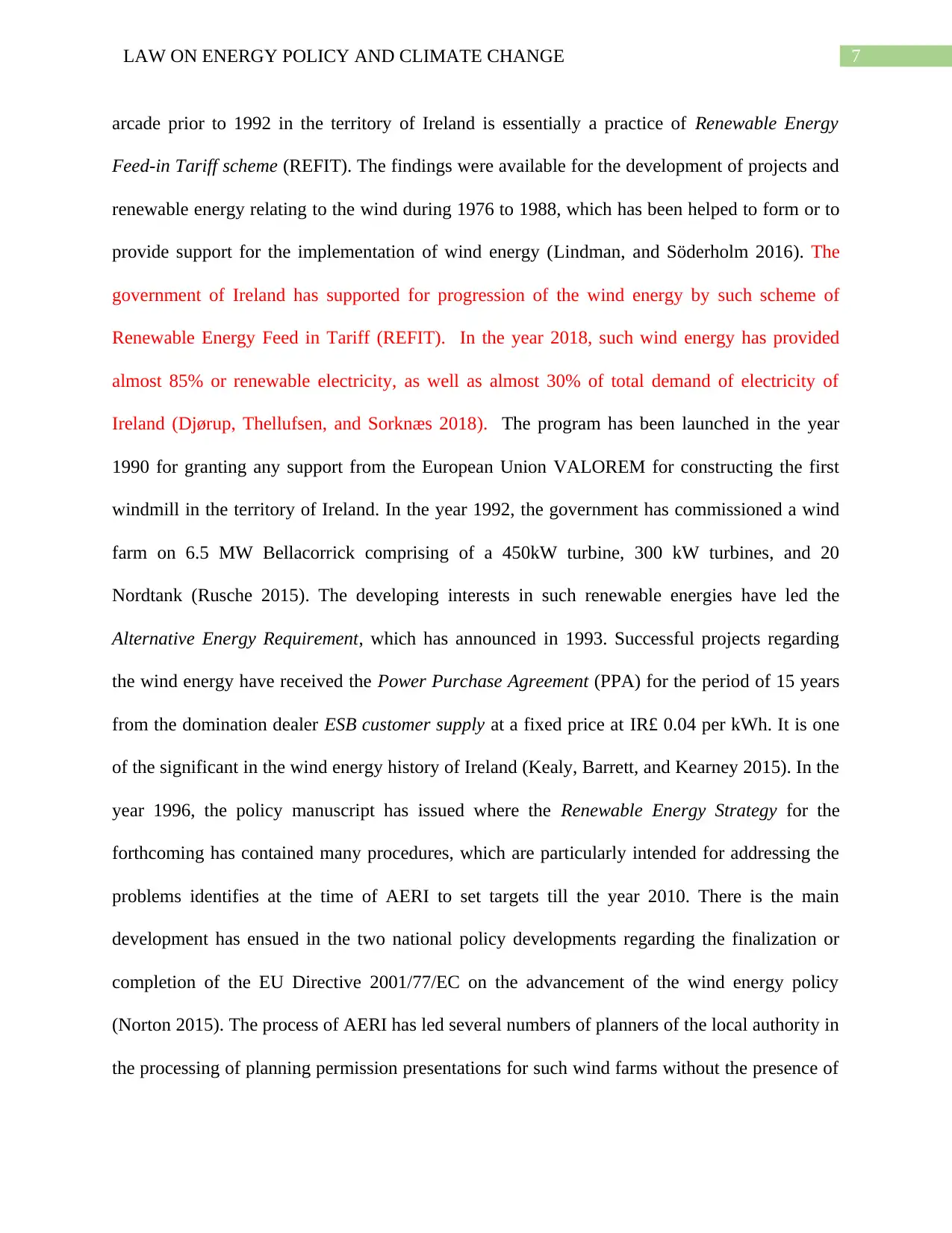
7LAW ON ENERGY POLICY AND CLIMATE CHANGE
arcade prior to 1992 in the territory of Ireland is essentially a practice of Renewable Energy
Feed-in Tariff scheme (REFIT). The findings were available for the development of projects and
renewable energy relating to the wind during 1976 to 1988, which has been helped to form or to
provide support for the implementation of wind energy (Lindman, and Söderholm 2016). The
government of Ireland has supported for progression of the wind energy by such scheme of
Renewable Energy Feed in Tariff (REFIT). In the year 2018, such wind energy has provided
almost 85% or renewable electricity, as well as almost 30% of total demand of electricity of
Ireland (Djørup, Thellufsen, and Sorknæs 2018). The program has been launched in the year
1990 for granting any support from the European Union VALOREM for constructing the first
windmill in the territory of Ireland. In the year 1992, the government has commissioned a wind
farm on 6.5 MW Bellacorrick comprising of a 450kW turbine, 300 kW turbines, and 20
Nordtank (Rusche 2015). The developing interests in such renewable energies have led the
Alternative Energy Requirement, which has announced in 1993. Successful projects regarding
the wind energy have received the Power Purchase Agreement (PPA) for the period of 15 years
from the domination dealer ESB customer supply at a fixed price at IR£ 0.04 per kWh. It is one
of the significant in the wind energy history of Ireland (Kealy, Barrett, and Kearney 2015). In the
year 1996, the policy manuscript has issued where the Renewable Energy Strategy for the
forthcoming has contained many procedures, which are particularly intended for addressing the
problems identifies at the time of AERI to set targets till the year 2010. There is the main
development has ensued in the two national policy developments regarding the finalization or
completion of the EU Directive 2001/77/EC on the advancement of the wind energy policy
(Norton 2015). The process of AERI has led several numbers of planners of the local authority in
the processing of planning permission presentations for such wind farms without the presence of
arcade prior to 1992 in the territory of Ireland is essentially a practice of Renewable Energy
Feed-in Tariff scheme (REFIT). The findings were available for the development of projects and
renewable energy relating to the wind during 1976 to 1988, which has been helped to form or to
provide support for the implementation of wind energy (Lindman, and Söderholm 2016). The
government of Ireland has supported for progression of the wind energy by such scheme of
Renewable Energy Feed in Tariff (REFIT). In the year 2018, such wind energy has provided
almost 85% or renewable electricity, as well as almost 30% of total demand of electricity of
Ireland (Djørup, Thellufsen, and Sorknæs 2018). The program has been launched in the year
1990 for granting any support from the European Union VALOREM for constructing the first
windmill in the territory of Ireland. In the year 1992, the government has commissioned a wind
farm on 6.5 MW Bellacorrick comprising of a 450kW turbine, 300 kW turbines, and 20
Nordtank (Rusche 2015). The developing interests in such renewable energies have led the
Alternative Energy Requirement, which has announced in 1993. Successful projects regarding
the wind energy have received the Power Purchase Agreement (PPA) for the period of 15 years
from the domination dealer ESB customer supply at a fixed price at IR£ 0.04 per kWh. It is one
of the significant in the wind energy history of Ireland (Kealy, Barrett, and Kearney 2015). In the
year 1996, the policy manuscript has issued where the Renewable Energy Strategy for the
forthcoming has contained many procedures, which are particularly intended for addressing the
problems identifies at the time of AERI to set targets till the year 2010. There is the main
development has ensued in the two national policy developments regarding the finalization or
completion of the EU Directive 2001/77/EC on the advancement of the wind energy policy
(Norton 2015). The process of AERI has led several numbers of planners of the local authority in
the processing of planning permission presentations for such wind farms without the presence of
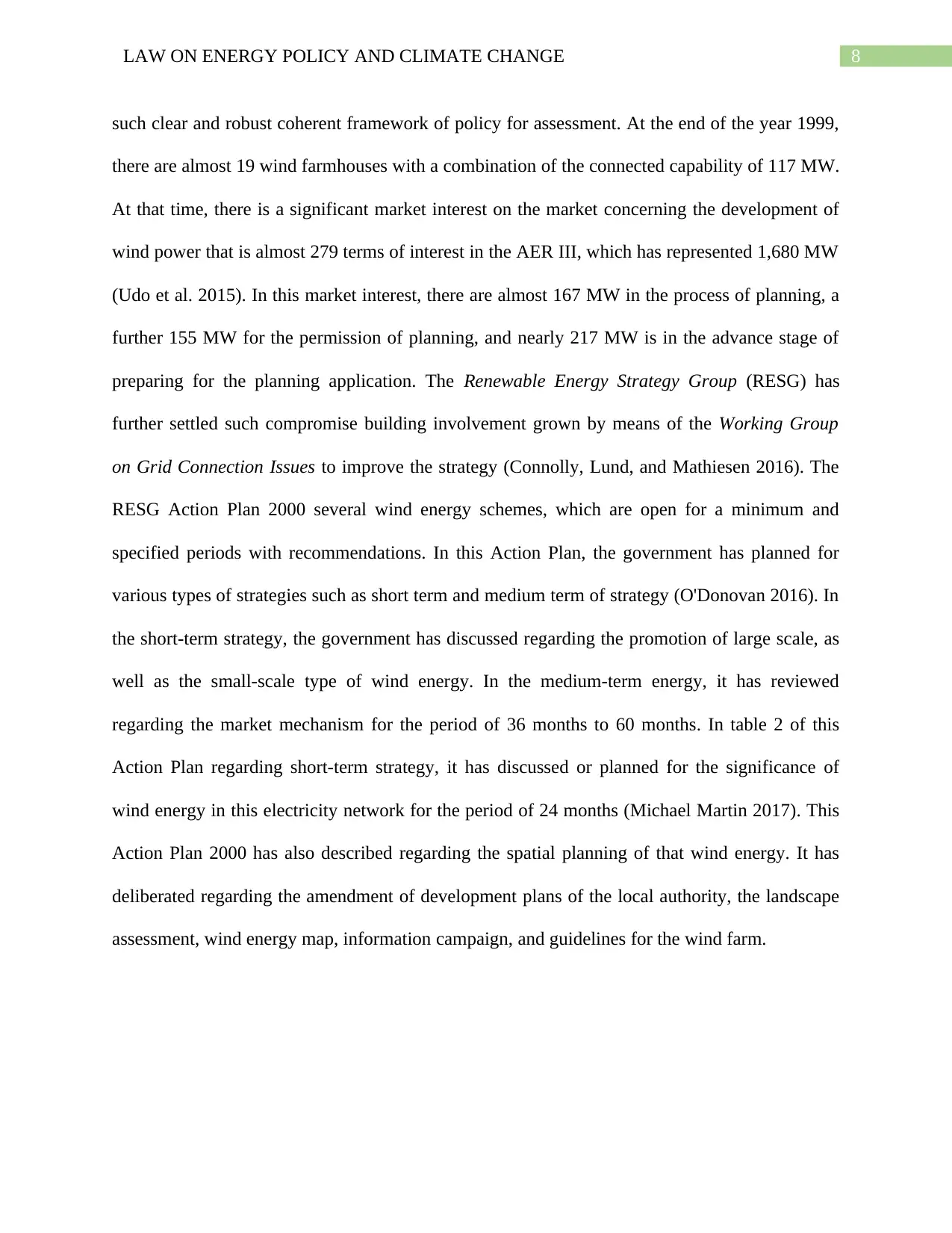
8LAW ON ENERGY POLICY AND CLIMATE CHANGE
such clear and robust coherent framework of policy for assessment. At the end of the year 1999,
there are almost 19 wind farmhouses with a combination of the connected capability of 117 MW.
At that time, there is a significant market interest on the market concerning the development of
wind power that is almost 279 terms of interest in the AER III, which has represented 1,680 MW
(Udo et al. 2015). In this market interest, there are almost 167 MW in the process of planning, a
further 155 MW for the permission of planning, and nearly 217 MW is in the advance stage of
preparing for the planning application. The Renewable Energy Strategy Group (RESG) has
further settled such compromise building involvement grown by means of the Working Group
on Grid Connection Issues to improve the strategy (Connolly, Lund, and Mathiesen 2016). The
RESG Action Plan 2000 several wind energy schemes, which are open for a minimum and
specified periods with recommendations. In this Action Plan, the government has planned for
various types of strategies such as short term and medium term of strategy (O'Donovan 2016). In
the short-term strategy, the government has discussed regarding the promotion of large scale, as
well as the small-scale type of wind energy. In the medium-term energy, it has reviewed
regarding the market mechanism for the period of 36 months to 60 months. In table 2 of this
Action Plan regarding short-term strategy, it has discussed or planned for the significance of
wind energy in this electricity network for the period of 24 months (Michael Martin 2017). This
Action Plan 2000 has also described regarding the spatial planning of that wind energy. It has
deliberated regarding the amendment of development plans of the local authority, the landscape
assessment, wind energy map, information campaign, and guidelines for the wind farm.
such clear and robust coherent framework of policy for assessment. At the end of the year 1999,
there are almost 19 wind farmhouses with a combination of the connected capability of 117 MW.
At that time, there is a significant market interest on the market concerning the development of
wind power that is almost 279 terms of interest in the AER III, which has represented 1,680 MW
(Udo et al. 2015). In this market interest, there are almost 167 MW in the process of planning, a
further 155 MW for the permission of planning, and nearly 217 MW is in the advance stage of
preparing for the planning application. The Renewable Energy Strategy Group (RESG) has
further settled such compromise building involvement grown by means of the Working Group
on Grid Connection Issues to improve the strategy (Connolly, Lund, and Mathiesen 2016). The
RESG Action Plan 2000 several wind energy schemes, which are open for a minimum and
specified periods with recommendations. In this Action Plan, the government has planned for
various types of strategies such as short term and medium term of strategy (O'Donovan 2016). In
the short-term strategy, the government has discussed regarding the promotion of large scale, as
well as the small-scale type of wind energy. In the medium-term energy, it has reviewed
regarding the market mechanism for the period of 36 months to 60 months. In table 2 of this
Action Plan regarding short-term strategy, it has discussed or planned for the significance of
wind energy in this electricity network for the period of 24 months (Michael Martin 2017). This
Action Plan 2000 has also described regarding the spatial planning of that wind energy. It has
deliberated regarding the amendment of development plans of the local authority, the landscape
assessment, wind energy map, information campaign, and guidelines for the wind farm.
⊘ This is a preview!⊘
Do you want full access?
Subscribe today to unlock all pages.

Trusted by 1+ million students worldwide
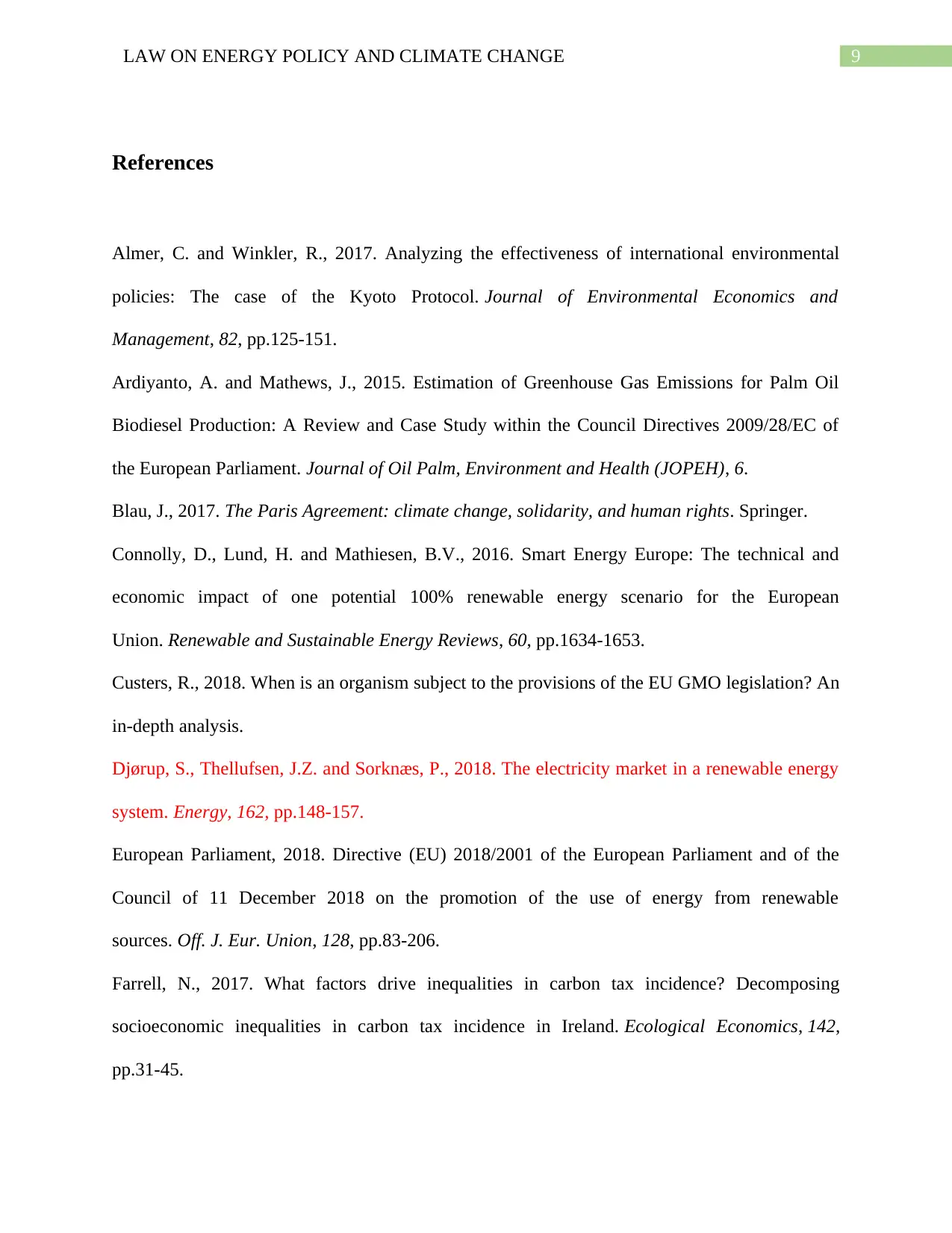
9LAW ON ENERGY POLICY AND CLIMATE CHANGE
References
Almer, C. and Winkler, R., 2017. Analyzing the effectiveness of international environmental
policies: The case of the Kyoto Protocol. Journal of Environmental Economics and
Management, 82, pp.125-151.
Ardiyanto, A. and Mathews, J., 2015. Estimation of Greenhouse Gas Emissions for Palm Oil
Biodiesel Production: A Review and Case Study within the Council Directives 2009/28/EC of
the European Parliament. Journal of Oil Palm, Environment and Health (JOPEH), 6.
Blau, J., 2017. The Paris Agreement: climate change, solidarity, and human rights. Springer.
Connolly, D., Lund, H. and Mathiesen, B.V., 2016. Smart Energy Europe: The technical and
economic impact of one potential 100% renewable energy scenario for the European
Union. Renewable and Sustainable Energy Reviews, 60, pp.1634-1653.
Custers, R., 2018. When is an organism subject to the provisions of the EU GMO legislation? An
in-depth analysis.
Djørup, S., Thellufsen, J.Z. and Sorknæs, P., 2018. The electricity market in a renewable energy
system. Energy, 162, pp.148-157.
European Parliament, 2018. Directive (EU) 2018/2001 of the European Parliament and of the
Council of 11 December 2018 on the promotion of the use of energy from renewable
sources. Off. J. Eur. Union, 128, pp.83-206.
Farrell, N., 2017. What factors drive inequalities in carbon tax incidence? Decomposing
socioeconomic inequalities in carbon tax incidence in Ireland. Ecological Economics, 142,
pp.31-45.
References
Almer, C. and Winkler, R., 2017. Analyzing the effectiveness of international environmental
policies: The case of the Kyoto Protocol. Journal of Environmental Economics and
Management, 82, pp.125-151.
Ardiyanto, A. and Mathews, J., 2015. Estimation of Greenhouse Gas Emissions for Palm Oil
Biodiesel Production: A Review and Case Study within the Council Directives 2009/28/EC of
the European Parliament. Journal of Oil Palm, Environment and Health (JOPEH), 6.
Blau, J., 2017. The Paris Agreement: climate change, solidarity, and human rights. Springer.
Connolly, D., Lund, H. and Mathiesen, B.V., 2016. Smart Energy Europe: The technical and
economic impact of one potential 100% renewable energy scenario for the European
Union. Renewable and Sustainable Energy Reviews, 60, pp.1634-1653.
Custers, R., 2018. When is an organism subject to the provisions of the EU GMO legislation? An
in-depth analysis.
Djørup, S., Thellufsen, J.Z. and Sorknæs, P., 2018. The electricity market in a renewable energy
system. Energy, 162, pp.148-157.
European Parliament, 2018. Directive (EU) 2018/2001 of the European Parliament and of the
Council of 11 December 2018 on the promotion of the use of energy from renewable
sources. Off. J. Eur. Union, 128, pp.83-206.
Farrell, N., 2017. What factors drive inequalities in carbon tax incidence? Decomposing
socioeconomic inequalities in carbon tax incidence in Ireland. Ecological Economics, 142,
pp.31-45.
Paraphrase This Document
Need a fresh take? Get an instant paraphrase of this document with our AI Paraphraser
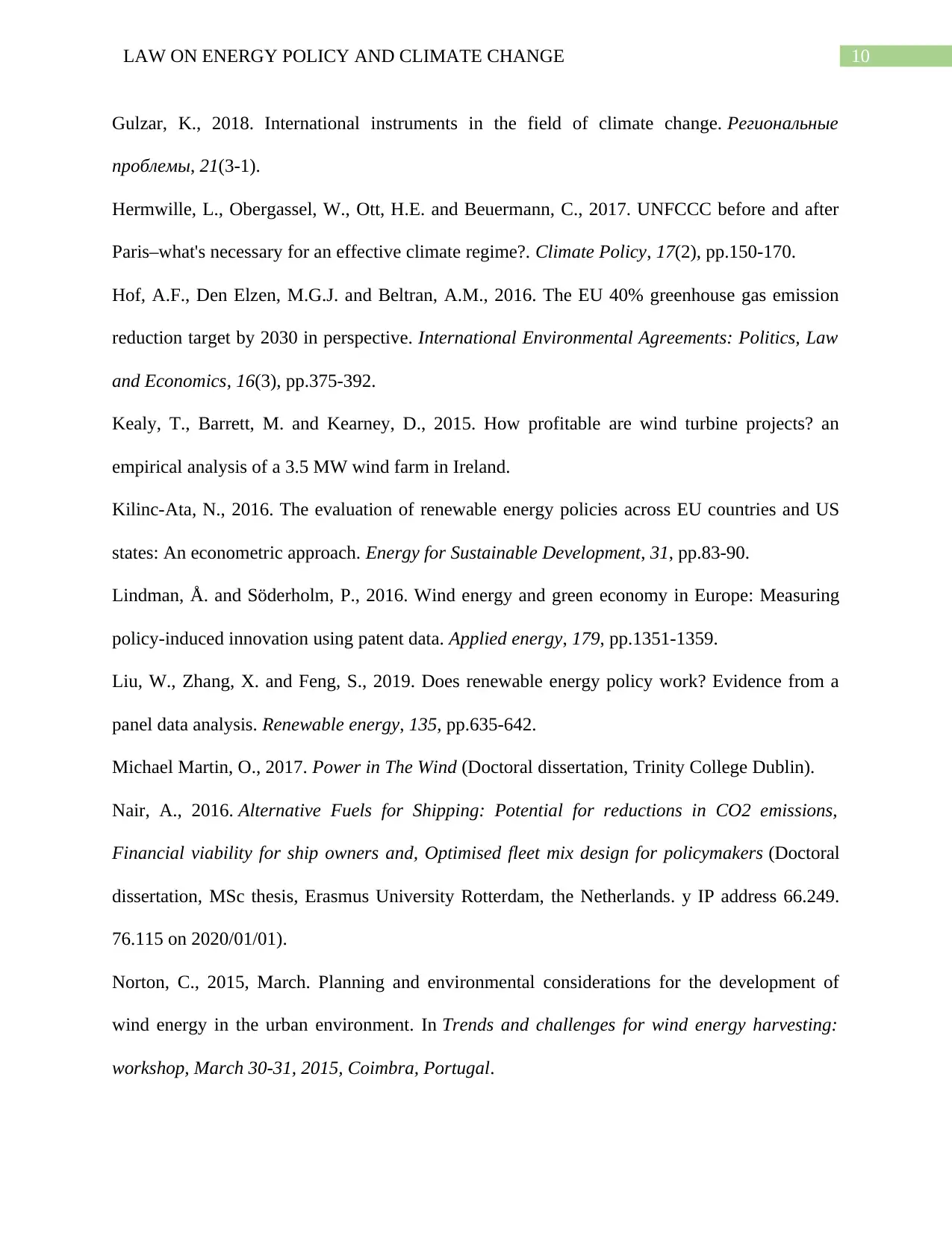
10LAW ON ENERGY POLICY AND CLIMATE CHANGE
Gulzar, K., 2018. International instruments in the field of climate change. Региональные
проблемы, 21(3-1).
Hermwille, L., Obergassel, W., Ott, H.E. and Beuermann, C., 2017. UNFCCC before and after
Paris–what's necessary for an effective climate regime?. Climate Policy, 17(2), pp.150-170.
Hof, A.F., Den Elzen, M.G.J. and Beltran, A.M., 2016. The EU 40% greenhouse gas emission
reduction target by 2030 in perspective. International Environmental Agreements: Politics, Law
and Economics, 16(3), pp.375-392.
Kealy, T., Barrett, M. and Kearney, D., 2015. How profitable are wind turbine projects? an
empirical analysis of a 3.5 MW wind farm in Ireland.
Kilinc-Ata, N., 2016. The evaluation of renewable energy policies across EU countries and US
states: An econometric approach. Energy for Sustainable Development, 31, pp.83-90.
Lindman, Å. and Söderholm, P., 2016. Wind energy and green economy in Europe: Measuring
policy-induced innovation using patent data. Applied energy, 179, pp.1351-1359.
Liu, W., Zhang, X. and Feng, S., 2019. Does renewable energy policy work? Evidence from a
panel data analysis. Renewable energy, 135, pp.635-642.
Michael Martin, O., 2017. Power in The Wind (Doctoral dissertation, Trinity College Dublin).
Nair, A., 2016. Alternative Fuels for Shipping: Potential for reductions in CO2 emissions,
Financial viability for ship owners and, Optimised fleet mix design for policymakers (Doctoral
dissertation, MSc thesis, Erasmus University Rotterdam, the Netherlands. y IP address 66.249.
76.115 on 2020/01/01).
Norton, C., 2015, March. Planning and environmental considerations for the development of
wind energy in the urban environment. In Trends and challenges for wind energy harvesting:
workshop, March 30-31, 2015, Coimbra, Portugal.
Gulzar, K., 2018. International instruments in the field of climate change. Региональные
проблемы, 21(3-1).
Hermwille, L., Obergassel, W., Ott, H.E. and Beuermann, C., 2017. UNFCCC before and after
Paris–what's necessary for an effective climate regime?. Climate Policy, 17(2), pp.150-170.
Hof, A.F., Den Elzen, M.G.J. and Beltran, A.M., 2016. The EU 40% greenhouse gas emission
reduction target by 2030 in perspective. International Environmental Agreements: Politics, Law
and Economics, 16(3), pp.375-392.
Kealy, T., Barrett, M. and Kearney, D., 2015. How profitable are wind turbine projects? an
empirical analysis of a 3.5 MW wind farm in Ireland.
Kilinc-Ata, N., 2016. The evaluation of renewable energy policies across EU countries and US
states: An econometric approach. Energy for Sustainable Development, 31, pp.83-90.
Lindman, Å. and Söderholm, P., 2016. Wind energy and green economy in Europe: Measuring
policy-induced innovation using patent data. Applied energy, 179, pp.1351-1359.
Liu, W., Zhang, X. and Feng, S., 2019. Does renewable energy policy work? Evidence from a
panel data analysis. Renewable energy, 135, pp.635-642.
Michael Martin, O., 2017. Power in The Wind (Doctoral dissertation, Trinity College Dublin).
Nair, A., 2016. Alternative Fuels for Shipping: Potential for reductions in CO2 emissions,
Financial viability for ship owners and, Optimised fleet mix design for policymakers (Doctoral
dissertation, MSc thesis, Erasmus University Rotterdam, the Netherlands. y IP address 66.249.
76.115 on 2020/01/01).
Norton, C., 2015, March. Planning and environmental considerations for the development of
wind energy in the urban environment. In Trends and challenges for wind energy harvesting:
workshop, March 30-31, 2015, Coimbra, Portugal.
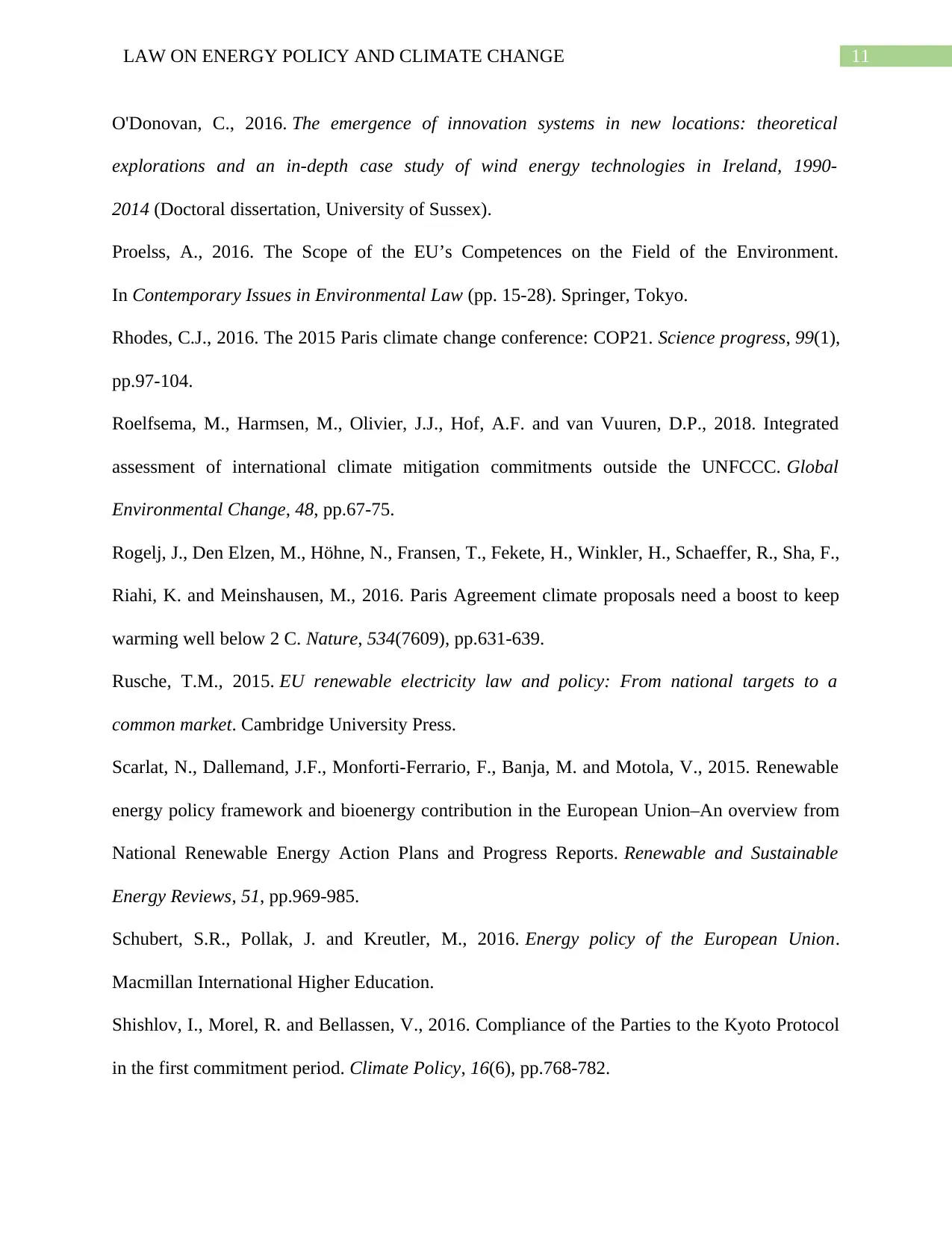
11LAW ON ENERGY POLICY AND CLIMATE CHANGE
O'Donovan, C., 2016. The emergence of innovation systems in new locations: theoretical
explorations and an in-depth case study of wind energy technologies in Ireland, 1990-
2014 (Doctoral dissertation, University of Sussex).
Proelss, A., 2016. The Scope of the EU’s Competences on the Field of the Environment.
In Contemporary Issues in Environmental Law (pp. 15-28). Springer, Tokyo.
Rhodes, C.J., 2016. The 2015 Paris climate change conference: COP21. Science progress, 99(1),
pp.97-104.
Roelfsema, M., Harmsen, M., Olivier, J.J., Hof, A.F. and van Vuuren, D.P., 2018. Integrated
assessment of international climate mitigation commitments outside the UNFCCC. Global
Environmental Change, 48, pp.67-75.
Rogelj, J., Den Elzen, M., Höhne, N., Fransen, T., Fekete, H., Winkler, H., Schaeffer, R., Sha, F.,
Riahi, K. and Meinshausen, M., 2016. Paris Agreement climate proposals need a boost to keep
warming well below 2 C. Nature, 534(7609), pp.631-639.
Rusche, T.M., 2015. EU renewable electricity law and policy: From national targets to a
common market. Cambridge University Press.
Scarlat, N., Dallemand, J.F., Monforti-Ferrario, F., Banja, M. and Motola, V., 2015. Renewable
energy policy framework and bioenergy contribution in the European Union–An overview from
National Renewable Energy Action Plans and Progress Reports. Renewable and Sustainable
Energy Reviews, 51, pp.969-985.
Schubert, S.R., Pollak, J. and Kreutler, M., 2016. Energy policy of the European Union.
Macmillan International Higher Education.
Shishlov, I., Morel, R. and Bellassen, V., 2016. Compliance of the Parties to the Kyoto Protocol
in the first commitment period. Climate Policy, 16(6), pp.768-782.
O'Donovan, C., 2016. The emergence of innovation systems in new locations: theoretical
explorations and an in-depth case study of wind energy technologies in Ireland, 1990-
2014 (Doctoral dissertation, University of Sussex).
Proelss, A., 2016. The Scope of the EU’s Competences on the Field of the Environment.
In Contemporary Issues in Environmental Law (pp. 15-28). Springer, Tokyo.
Rhodes, C.J., 2016. The 2015 Paris climate change conference: COP21. Science progress, 99(1),
pp.97-104.
Roelfsema, M., Harmsen, M., Olivier, J.J., Hof, A.F. and van Vuuren, D.P., 2018. Integrated
assessment of international climate mitigation commitments outside the UNFCCC. Global
Environmental Change, 48, pp.67-75.
Rogelj, J., Den Elzen, M., Höhne, N., Fransen, T., Fekete, H., Winkler, H., Schaeffer, R., Sha, F.,
Riahi, K. and Meinshausen, M., 2016. Paris Agreement climate proposals need a boost to keep
warming well below 2 C. Nature, 534(7609), pp.631-639.
Rusche, T.M., 2015. EU renewable electricity law and policy: From national targets to a
common market. Cambridge University Press.
Scarlat, N., Dallemand, J.F., Monforti-Ferrario, F., Banja, M. and Motola, V., 2015. Renewable
energy policy framework and bioenergy contribution in the European Union–An overview from
National Renewable Energy Action Plans and Progress Reports. Renewable and Sustainable
Energy Reviews, 51, pp.969-985.
Schubert, S.R., Pollak, J. and Kreutler, M., 2016. Energy policy of the European Union.
Macmillan International Higher Education.
Shishlov, I., Morel, R. and Bellassen, V., 2016. Compliance of the Parties to the Kyoto Protocol
in the first commitment period. Climate Policy, 16(6), pp.768-782.
⊘ This is a preview!⊘
Do you want full access?
Subscribe today to unlock all pages.

Trusted by 1+ million students worldwide
1 out of 13
Related Documents
Your All-in-One AI-Powered Toolkit for Academic Success.
+13062052269
info@desklib.com
Available 24*7 on WhatsApp / Email
![[object Object]](/_next/static/media/star-bottom.7253800d.svg)
Unlock your academic potential
Copyright © 2020–2026 A2Z Services. All Rights Reserved. Developed and managed by ZUCOL.





